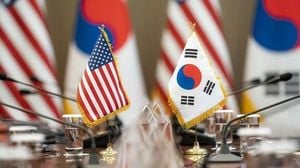In a significant shift in international diplomacy, the United Kingdom announced on July 29, 2025, that it will formally recognize a Palestinian state in September unless Israel agrees to several stringent conditions. This move follows France's similar declaration earlier in the month and marks a bold stance by two influential members of the Group of Seven and the United Nations Security Council. The UK’s decision, articulated by Prime Minister Keir Starmer, aims to exert pressure on Israel to ease the ongoing humanitarian crisis in Gaza and revive the long-stalled two-state peace process.
Starmer’s announcement outlined clear prerequisites for Israel: a ceasefire in Gaza, cessation of settlement expansion in the West Bank, commitment to a sustainable peace plan, and resumption of UN humanitarian aid. Additionally, while not conditions for recognition, Starmer called on Hamas to release hostages, disarm, and relinquish any governing role in Gaza, reiterating the UK’s position that Hamas is a terrorist organization excluded from a viable two-state solution.
Britain’s historic support for an independent Palestinian state has always been tied to a negotiated peace agreement. However, UK officials now express deep concern that the two-state solution is slipping away, citing the devastation in Gaza after 22 months of conflict and Israel’s aggressive settlement expansion. Cabinet minister Heidi Alexander emphasized the urgency, stating, “The moment to act is now,” highlighting the effective annexation occurring in the West Bank.
Domestically, the UK government faces mounting pressure. Over 250 members of the House of Commons have signed a letter urging recognition of Palestinian statehood, reflecting growing public sympathy amid harrowing reports of hunger and displacement in Gaza. Opinion polls show a majority of Britons support recognition, though a significant portion remains undecided.
Internationally, the reaction has been sharply divided. Israeli Prime Minister Benjamin Netanyahu condemned the UK’s move as “rewarding Hamas’s monstrous terrorism and punishing its victims.” The Hostages Family Forum, representing relatives of Israeli captives, echoed this sentiment, stating, “Recognizing a Palestinian state while 50 hostages remain trapped in Hamas tunnels amounts to rewarding terrorism.” British-Israeli Emily Damari, who endured captivity for over a year, labeled Starmer’s stance as “a moral failure.”
Conversely, the Palestinian Authority, regarded by the UK as the legitimate representative of Palestinians, welcomed the announcement. Husam Zomlot, the Palestinian envoy in London, described it as “a corrective to over a century of dispossession,” underscoring the historical grievances endured by Palestinians. Foreign Secretary David Lammy acknowledged Britain’s “special burden of responsibility” due to its colonial past and the 1917 Balfour Declaration, which promised a Jewish homeland but also pledged protection of Palestinian rights—a promise he said remains unfulfilled.
Within the UK’s political landscape, the right-of-center Conservative Party criticized the timing of the announcement. Priti Patel, the party’s foreign affairs spokeswoman, argued that recognition should be part of a formal peace process and not proceed while hostages remain captive and Hamas continues its activities. The centrist Liberal Democrats, led by Ed Davey, supported the move but cautioned against using Palestinian statehood as a “bargaining chip.”
The UK and France hope their declarations will spark a broader diplomatic wave. Malta, an EU member, also pledged to recognize Palestine in September. However, Germany remains cautious; Chancellor Friedrich Merz reiterated Berlin’s support for a two-state solution but stated there are no short-term plans for recognition, emphasizing the need for a ceasefire and humanitarian relief first.
The United States, wielding significant influence over the peace process, has responded with skepticism. President Donald Trump criticized Starmer’s plan as “rewarding Hamas,” echoing sentiments expressed by US State Department spokeswoman Tammy Bruce, who called the move “a slap in the face” to victims of Hamas’s October 7, 2023, attacks. Yet, Trump’s initial reaction during a meeting with Starmer in Scotland appeared more restrained, with the president stating, “I’m not going to take a position, I don’t mind him taking a position.” This softer tone contrasted sharply with his dismissal of French President Emmanuel Macron’s similar announcement just days prior, when Trump said, “What he says doesn’t matter.”
Trump also publicly contradicted Netanyahu regarding conditions in Gaza, noting that televised images of children in the region indicate genuine starvation, a claim Netanyahu has disputed. This divergence highlights the complex and sometimes fractious dynamics within the pro-Israel camp in the US.
Meanwhile, some prominent figures within Trump’s base express growing unease with Israel’s military actions. Steve Bannon, Trump’s former adviser, suggested that Trump’s acknowledgment of Gaza’s humanitarian crisis could accelerate waning support for Israel among younger MAGA supporters. Far-right Congresswoman Marjorie Taylor Greene went further, labeling Israel’s actions in Gaza as “genocide.”
Public opinion in the US appears to be shifting. A recent Gallup poll shows support for Israel’s actions in Gaza has dropped to 32%, the lowest since polling began in November 2023. Despite this, support remains strong among Republicans, with 71% backing Israel’s offensive. GOP Senator Thom Tillis warned that the Gaza conflict might pose political challenges for Trump, noting, “If you see starvation, you try to fix it.”
US Ambassador to Israel Mike Huckabee reaffirmed the strength of US-Israel relations, asserting there is no break between Netanyahu and Trump. Meanwhile, Trump’s special envoy, Steve Witkoff, is scheduled to visit Israel on August 1, 2025, to discuss next steps in addressing the Gaza situation.
Recognition of Palestinian statehood remains a complex and contentious issue. Under the 1933 Montevideo Convention, a state must have a permanent population, defined territory, effective government, and the capacity for international relations. As of March 2025, 147 UN member states recognize Palestine, including major powers like Russia, China, and India, as well as European nations such as Spain and Norway.
However, admission to the United Nations requires Security Council approval, where a veto by any permanent member—including the US—can block membership. The Palestinian application in 2011 failed to reach a vote due to lack of consensus and a US threat to veto.
The two-state solution envisions an independent Palestinian state alongside Israel, with Palestinians seeking sovereignty over the West Bank, East Jerusalem, and Gaza—territories occupied by Israel since the 1967 Six-Day War. Yet, Israeli settlements have expanded significantly, with approximately 600,000 Israelis now living in the West Bank and East Jerusalem, complicating potential borders.
Italy’s Foreign Minister Antonio Tajani emphasized that any Palestinian state must recognize Israel to resolve the conflict, warning that failure to do so perpetuates the problem. Spain, already recognizing Palestinian statehood, and Saudi Arabia’s foreign ministry have also expressed support for renewed efforts toward peace.
As the UK and France prepare to formalize recognition at the UN General Assembly this September, the move symbolizes a critical juncture in the Israeli-Palestinian conflict. It underscores growing international frustration with stalled peace efforts and the devastating humanitarian toll in Gaza, while also exposing deep divisions among global powers and within domestic political arenas.
Whether this diplomatic push will translate into tangible progress remains uncertain. The path to peace is fraught with challenges, but for many, the time to act has indeed arrived.




